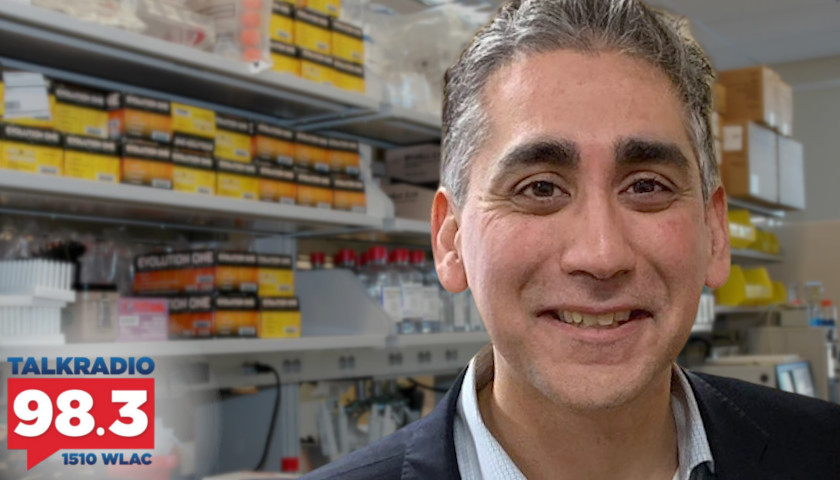Live from Music Row Thursday morning on The Tennessee Star Report with Michael Patrick Leahy – broadcast on Nashville’s Talk Radio 98.3 and 1510 WLAC weekdays from 5:00 a.m. to 8:00 a.m. – Leahy was joined on the newsmakers line by Dr. Manny Sethi.
During the third hour of the show, Dr. Sethi discussed China’s stronghold on medical and pharmaceutical supplies to the United States while calling for the need to repatriate the supply chain.
Leahy: We are joined now by our good friend and the candidate for the Republican nomination of the U.S. Senate here in Tennessee, Dr. Manny Sethi. Welcome, Dr. Manny.
Sethi: Hey Michael. Thanks, brother. I hope you are doing well on this beautiful morning.
Leahy: I’m delighted to have you on because you actually know what you’re talking about when it comes to medicine and science. You are an emergency room surgeon here in Nashville. I guess you’ve gone back and you are doing more work now because of the crisis?
Sethi: Yeah, I’ve been on the front lines of this thing for about four weeks now. In Nashville, we’ve seen a rise of coronavirus patients come through. But other places haven’t. But yes, once this happened I felt the Lord put in my heart to make a difference. It’s why I’m running for the Senate to help make a difference. I just felt this is a generational fight. I’ve suspended the campaign for a little while and started to take care of patients. But I think we are on the down-slide of this I think God willing.
Leahy: When you say taking care of patients, what is your typical day like in the emergency room?
Sethi: For me its more of if someone gets ejected from a car by 30 feet or falls from a ladder or there’s a gunfight and somebody gets really injured or a stabbing. I take those patients to the ER immediately. Now the issue there is you just don’t know who’s got COVID and who doesn’t.
Because in the heat of the moment, it doesn’t matter to us because trauma surgeons are all about life and saving lives in the clutch. That’s what I’m seeing. Now I’ve operated on a couple of people who had the coronavirus. Who we knew had it and you have to take the proper precautions. It’s kind of scary. You dress up in this kind of protective gear.
Leahy: Do they have to fit you for this gear? My brother in law is an EMT surgeon and they fit him with a very specific PPE gear. Physical protective equipment. Did they suit you up in that?
Sethi: Yes. You just try it on and it takes five minutes and you move on.
Leahy: Are you seeing more trauma cases than normal or is it less than normal?
Sethi: I think it’s more than normal because lots of the hospitals in Tennessee and around have shut down or don’t have the personal protective equipment so they’ve been sending folks to us.
Leahy: Ahhh. Interesting.
Sethi: I think there’s been an uptick. I was on a call about two weeks ago on a weekend and I literally operated from Friday night to Sunday pretty much. That’s very rare. So it’s been busy.
Leahy: Is there a shortage of personal protection equipment? We’ve heard that a lot. Is there and is that being alleviated?
Sethi: Here’s the bottom line with all that. There is. But we are too reliant on the Chinese Communist government because our healthcare supply chain is in China. They make the balance of our gloves, masks, gowns, and medications. All or parts of these medications or parts of these medications are made in China. They can’t be made here. We need to bring that back to America immediately.
Leahy: You had a press release on that very topic yesterday. Do you want to elaborate on some of your recommendations to do that?
Sethi: Sure. What we call it is “Put American Health Back in American Hands.” We are reliant on the Chinese Communist government for our health. Think about what I just said. All of these things are made in China and it’s because these global elitists and Washington insiders for many years said we’ll get it for cheaper and all this stuff so why don’t we make it all in China. Meanwhile, what’s happening is that we’re trading our national security and growing dependent on the Chinese government.
So the time has come, if we’ve learned anything from this crisis is that we need to repatriate these companies and industries and bring them back to America. One night I couldn’t sleep and around 2:00 a.m. I was really bothered by this and I started looking around over the internet and there are over 2,000 companies that make drugs in China that export around the world. And we have to bring those companies back to the United States.
So that’s our plan to put forward with five points about how we do that with tax incentives. With deregulating. By creating more vocational and technical educational opportunities to make PPE here in the states. And so that’s what we’ve got to do. If I’m your next U.S. Senator we’re doing that immediately.
Leahy: Help me out with this. I don’t get why it’s so hard for an American company to make personal protection equipment. I mean its basic stuff ,right? Why aren’t American companies getting orders to build this stuff right now?
Sethi: Here’s the challenge. First of all, the cost of labor is what they say but the biggest challenge is the regulations. So you make a mask and that N-95 mask has to have these five things. Then the FDA comes then the other guy comes. There is so much regulation that these companies can’t survive it by the FDA. We have to aggressively de-regulate. Now we’ve got to keep it safe.
Like the president is doing, we’ve got to continue to de-regulate. As you saw it’s been the greatest economy ever. And the reason is that we’ve cut red tape. This is no different. Imagine Mike, if I told you, hey we’re reliant on oil from China. We can’t find any oil in the United States. You’d say, that’s a problem. And this is no different.
Leahy: Is PPE equipment manufactured in China subject to different regulatory requirements than that PPE equipment manufactured in the United States?
Sethi: Yes. Absolutely it is. That’s a great question because here’s what’s been happening around the world. They’ve been opening up these boxes of N-95 masks and they are finding out so many of them are defective now. And the reason that that is happening is because for a month when these Chinese factories weren’t open because they were shut down, now they’re trying to make five times the production and really ramp up their supply chain. What’s happening is that they are making mistakes.
Leahy: That’s very interesting. Let’s talk a little bit about testing. Now the governor said he’s going to have a full-blown effort to increase testing. I’ve not seen it yet. Supposedly it’s going to happen over the weekend. We had 2,000 tests here in Tennessee yesterday.
Not exactly setting the world on fire with the number of tests. Why is it so difficult Manny to ramp up testing? I’m reading that the test manufacturers are shipping out thousands and tens of thousands of tests a day, and yet, we’re not seeing that ramp up. What’s the problem?
Sethi: The first thing is that I think this shows you the failure of government bureaucracy right? And how we have to think really differently in our federal government. That’s why our president is so effective. He’s a businessman. He’s able to move, shift, and change. Our government bureaucracy has failed us. The way we got into this problem was that the CDC wanted to create a test early on.
February they lost two or three weeks then realized the number of false negatives was really high. Then they said let’s try and do something else. Then we started to rely on the private sector which is what we should have done from the very beginning. Now we are behind the eight-ball because of this rapid demand. Now, the test that people want and need is something called immunosurveillance. What that means is we want to know if you were exposed to the coronavirus.
A lot of people can have this thing and not even know it. Someone who doesn’t know they had it give it if actively infected can they give it to somebody or take it home. Or, if they had it and they’ve now passed it, can they just go back to work and we don’t have to worry about it? Testing is important. The president mentioned this yesterday. That’s why there is this issue because of that lag time.
Leahy: Yesterday, Abbott Laboratories announced that antibody blood test that you are talking about that will tell if you’ve been exposed and had developed an immunity, that test they are shipping out a million of those this week to labs around the country. And they are going to be shipping out 20 million in June.
So it looks like the private sector is making tests for both antibody blood tests and whether you are positive or negative. Those tests are being shipped out. The problem that I’m seeing Manny is that they are not actually being tested at the state or county level at the rate they need to be. I don’t know. That’s what I’m curious about.
Sethi: I think its the failure of bureaucracy man. We have to get the tests in the right hands. Here’s the deal. We’ve got to move forward here as a country. We’ve got this horizontal containment strategy where we’ve shut down all of America and we’ve got to get started up again and we need a vertical containment strategy.
We’ve got to start protecting those people that are at risk and let the other people get back to work. Our economy is not going to survive this if we don’t. We need an economic strategy to restart America. And we’re going to release this really soon. And at the same time, we need a public health strategy.
Listen to the third hour here:
– – –
Tune in weekdays from 5:00 – 8:00 a.m. to the Tennessee Star Report with Michael Patrick Leahy on Talk Radio 98.3 FM WLAC 1510. Listen online at iHeart Radio.
Photo “Manny Sethi” by Manny Sethi.





